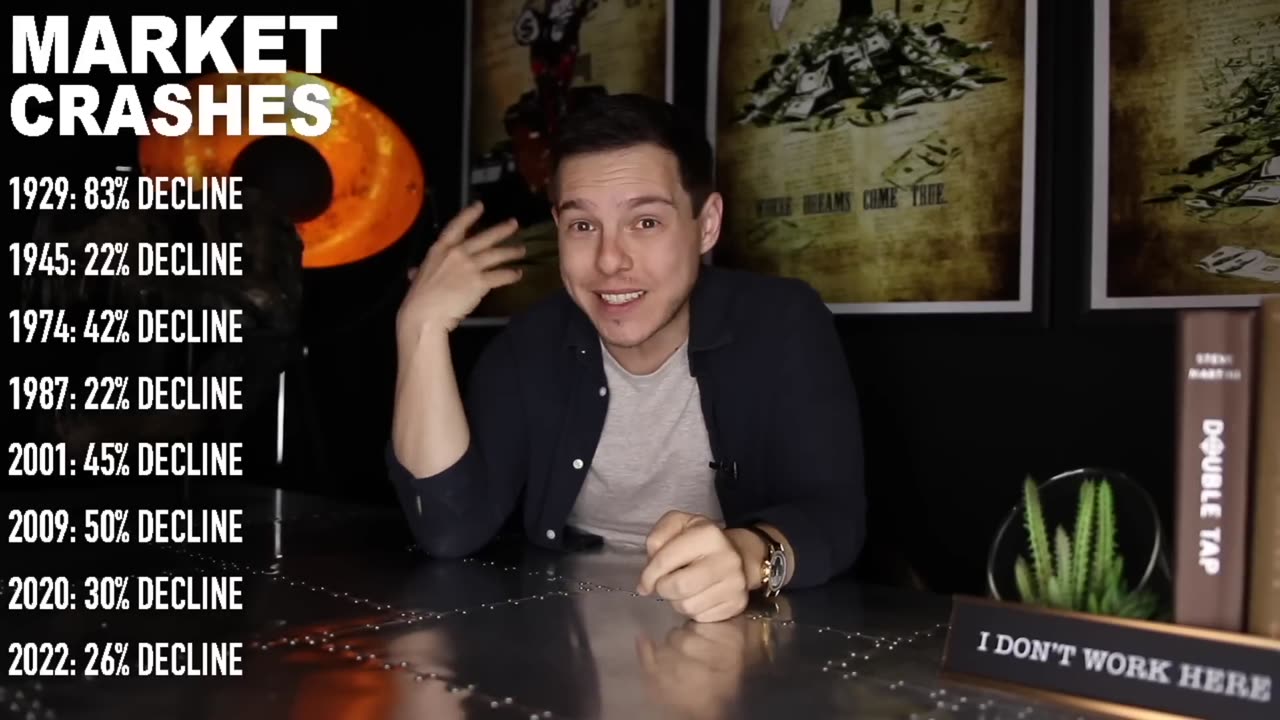Premium Only Content

The Next Stock Market Crash (How To Profit)
Let's talk about the chances of a 2024 Stock Market Drop and what you can best to do prepare - Enjoy! Add me on Instagram: GPStephan
THE CHANCE OF A STOCK MARKET DROP:
-Stock Market Correction: A 10% - 19.9% Decline
First, normal volatility throughout the markets is extremely common; since 1920, the SP500 has (on average) seen a 5% pullback 3x per year.
Market Corrections are also fairly common - on average, a 10% correction happens every 16 months, and throughout the last 20 years, a 10% drop has happened 11 times. In this case, the average drop has (so far) been 15.6% and lasts for 71.6 days.
-The Bear Market: A 20% - 39.9% Decline
According to data, this typically occurs every 7-10 years - and when this happens, stocks drop an average of 33% over a period of 363 days.
-The Stock Market Collapse: More than 40% Decline Throughout The Index
Throughout the last 120 years, this has only happened 4 times. Once in 1929, again during the 1970s, and again in 2009.
THE CHANCE OF A STOCK MARKET DROP IN 2024:
The economist John Hussman makes the argument that non-financial stocks are trading at levels that haven’t been seen since 1929 and 2001. Because of that, he believes that “These levels indicate the S&P 500 is likely to return around -5% annualized over the next 12 years.”
David Rosenberg also believes there’s truth to the claims that stocks are poised to fall, saying "Just like the clown at the circus who keeps blowing up the balloon, at some point, that balloon is going to pop…And I sort of look at the stock market, right now, as that clown of the circus blowing up the balloon." As he explains, “The S&P 500 is up 32% in the past 12 months while corporate profits rose just 4% in the fourth quarter, meaning that the vast majority of those gains clearly can't be attributed to improvements in earnings results.” Instead, the market is simply going higher for three main reasons: A better-than-feared economy, significant jumps in earnings estimates, and the expectations of lower rates - that’s it.
The investor Jeremy Grantham also seconds this by saying that “prolonged bull markets typically begin when unemployment is high, profit margins are depressed, and stock valuations are beaten down…Current conditions are the polar opposite of that."
HOW TO PREPARE IN THE FUTURE:
- Keep a 3-6 Month Cash Savings
That way, you won’t need to sell investments to pay for your living expenses in the event you lose your job, your income slows down, or something unforeseen comes up while the market is low.
- Diversify your investments.
The more you spread out your money, the more you reduce your risk and volatility.
- Continue The Long Term Plan of DCA
Studies show that the best thing you can do is just stick to the plan, keep buying, and do nothing long-term. Historically, even though a bear market might temporarily lose you an average of 33% - a BULL MARKET has seen an average gain of 158%, and it lasts almost 5 times longer, at 1742 days.
-
 34:19
34:19
The Official Corbett Report Rumble Channel
11 hours agoThe Blueprint for AI Government Revealed with Jacob Nordangård
1.7K7 -
 1:21:47
1:21:47
JULIE GREEN MINISTRIES
3 hours agoUNPRECEDENTED MOVES ARE BEING MADE TO BRING BACK THE GOLD STANDARD IN THIS NATION
100K117 -
 1:26:49
1:26:49
Chicks On The Right
3 hours agoKohlberger gets BLASTED, Macrons sue Candace, Tulsi goes after Obama, and more on Epstein files
19.3K -
 LIVE
LIVE
Welcome to the Rebellion Podcast
12 hours ago $0.60 earnedI Feel Fine - WTTR Podcast Live 7/24
278 watching -
 1:20:39
1:20:39
Game On!
17 hours ago $1.68 earnedCommanders Are Built To WIN NOW! 2025 Preview!
26.4K2 -
 LIVE
LIVE
The Bubba Army
23 hours agoGhislaine Maxwell to Testify! - Bubba the Love Sponge® Show | 7/24/25
1,795 watching -
 16:50
16:50
Chris From The 740
2 hours ago $0.42 earnedI Didn’t Expect to Like This Fan So Much – Ogery F11 Review!
10.8K -
 8:11
8:11
Millionaire Mentor
17 hours agoJohn James SHUTS DOWN AOC With One BRUTAL Sentence
22K22 -
 31:34
31:34
Friday Beers
15 hours ago $3.55 earnedOur Horrifying Night Drunk Ghost Hunting the Manson Murders
52.5K7 -
 4:09
4:09
Blackstone Griddles
14 hours agoEndless Summer Smashburgers on the Blackstone Griddle
23.5K5